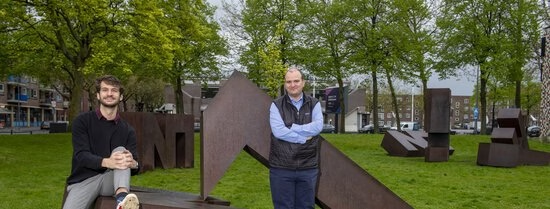What is the greatest threat to humanity? Whether you ask someone in science or someone in politics, you will probably get the same answer: climate change and nuclear weapons. Marin Lucic (26) is a master student in International Public Management and Policy, assisting Dr. Michal Onderco (35) with research on future security. "Our research is about the impact of technological developments on security and governance," says Michal.
The research group Global Social Challenges allows ESSB students to gain experience in researching global issues. Marin is one of those students. Prior to his master at EUR, he studied in Washington and Shanghai. His knowledge of China and the Chinese language come in handy in research work. "China is not always well understood in the world, although the country plays a key role. To understand what is going on, it helps to delve into untranslated, Chinese sources. I was able to help with that in this study," Marin explains.
Debate on nuclear energy and weapons
Michal is very glad for such help. Not least because the global debate on nuclear energy and weapons is now mainly approached from the point of view of the United States, Russia and Europe. Michal: "We want to understand the impact of certain technological changes on security and governance around the world. To achieve that, we need to factor in the Chinese point of view as well."
NPT Review Conference
The NPT Review Conference takes place every 5 years. This is a conference attended by China, France, Russia, the UK and the US. At that conference, the countries talk about how they want to use nuclear technology. The starting point is to use the technology for peaceful purposes, rather than for weapons. Another edition of the conference took place in 2021, and in that context, the results of the research Michal and Marin are working on were particularly relevant. "Climate change is a major challenge that is the focus of extensive research. But however you look at it, compared to nuclear energy and especially nuclear weapons, that is a 'slower' threat. Nuclear weapons could wipe out the world in minutes. That is why research into that threat is also necessary. It calls for a broad political discussion," Michal said.
Co-creation
Marin is in the final phase of his studies and is very satisfied with the way in which ESSB has designed the training. "EUR is a university that continues to think ahead and always wants to help students take the next step. My time at ESSB has made me aware of what I can contribute to society, perhaps as a lobbyist or as an analyst in a policy position in government. I am very grateful that I was able to contribute to Michal's work on a fascinating and highly relevant theme. It gave me confidence. Whereas at first I tended to argue at length about certain choices, Michal proved convinced long before I did. He would say: 'Yes, very good, this could work!' This ensured that a burden fell from my shoulders and that I could continue on the path I had chosen with a more relaxed frame of mind." Michal: "What we have achieved is really the result of co-creation. Marin is a smart, hard worker who remains curious to understand what is going on in the world. That attitude will take you places."
More information about China's view on and contribution to the nuclear debate? Read Michal and Marin's contribution to the Asia-Pacific Leadership Network.
- Researcher
- More information
This interview previously appeared in Spark magazine. This magazine is for students, alumni and partners of ESSB and showcases the positive impact that the faculty's education and research have on society.

